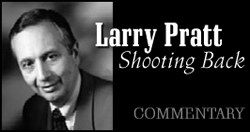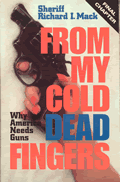Other Pratt Articles:
The Power to
Tax is The Power to
Destroy
All Guns Are Machine Guns, Right?
WHEN THE PEOPLE WERE THE POLICE
By Larry Pratt
February 26, 2004
NewsWithViews.com
There was a time when the word "police" was not usually used as a noun. It was a verb that described what the people did to keep order in society. Today the people only police a campground, or some similar action.
The history of the changing meaning of police is a history of the transformation of America from a society of limited government serving the people to our present plight where the people serve the government.
Borrowing on the idea of the kinsman redeemer in the Bible, America - even for decades beyond the War for Independence - relied on private prosecutors. Victims of serious crimes approached a community grand jury that would investigate the matter and issue an indictment if it concluded that a crime should be charged.
Then the victim, or his representative (generally an attorney, but sometimes a state attorney general) prosecuted the defendant before a petit jury of twelve men.
These are some of the findings from the research done by Roger Roots and published in the Seton Hall Constitutional Law Journal in an article entitled "Are Cops Constitutional?"
The term "prosecutor" meant criminal plaintiff and implied a private person. The idea was that criminal acts were not against the state but against the victim. Since people did not belong to the state and were masters of government, crimes could not be committed against the state. (One notable exception to this would be the crime of treason.) A government prosecutor was referred to as an attorney general and was rarely seen even after the beginning of the Republic.
Under such a system of criminal justice, who would be the victim to accuse another of owning or carrying a gun? Such a concept of crime also makes it harder to abridge the rights to free speech, press, religion and assembly as well as the right to keep and bear arms. The recent assault on the First Amendment perpetrated by the federal government - enactment of the Campaign Finance Law to protect incumbents from groups informing voters of Congressional voting records - would be nearly inconceivable in a system where crimes are limited to actual harm done to or threatened against another.
With such a view of justice, how would we have a War against Crime? The government would not be in a position, nor have the personnel, to prosecute such a war. No prosecutor, no police, and no consequent arrogance of power such as we see today.
Roots found that private prosecution meant that criminal cases were for the most part limited by the need of crime victims for vindication. Grand jurors often acted as the detectives of the period. In the early 1700's, grand jurors were sometimes called upon to make arrests in cases where suspects were armed and in large numbers. When a sheriff was unable to execute a warrant, he could call upon a posse of citizens to assist him.
"Formal criminal justice institutions dealt only with the most severe crimes. Misdemeanor offenses had to be dealt with by the private citizen on the private citizen's own terms. In other words, before the advent of professional policing, fewer crimes - and only the most serious crimes - were brought to the attention of the courts," Roots found.
Does that mean that much crime went not only unreported but also unpunished? On the contrary, visitors to the US such as Alexis de Toqueville found that there was little crime in the US and that criminals, while having little fear of a nearly non-existent government presence, had much to fear of the entire people. He marveled at how well such an undirected and non-professionalized system could work so well.
And the reason we changed was�?
[Roger Roots was interviewed on Live Fire;
the interview is archived on the web at www.gunowners.org/radio.htm.]
� 2004 Larry Pratt - All Rights Reserved
Larry Pratt has been Executive Director of Gun Owners of America for 27 years. GOA is a national membership organization of 300,000 Americans dedicated to promoting their second amendment freedom to keep and bear arms.
GOA lobbies for the pro-gun position in Washington and is involved in firearm issues in the states. GOA's work includes providing legal assistance to those involved in lawsuits with the Bureau of Alcohol, Tobacco and Firearms, the federal firearms law enforcement agency.
Pratt has appeared on numerous national radio and TV programs such as NBC's Today Show, CBS' Good Morning America, CNN's Crossfire and Larry King Live, Fox's Hannity & Colmes, MSNBC's Phil Donahue show and many others. He has debated Congressmen James Traficant, Jr. (D-OH), Charles Rangel (D-NY), Rep. Carolyn McCarthy (D-NY), Senator Frank Lautenberg (D-NJ), and Vice President Al Gore, among others. His columns have appeared in newspapers across the country.
He published a book, Armed People Victorious, in 1990 and was editor of a book, Safeguarding Liberty: The Constitution & Militias, 1995. His latest book, On the Firing Line: Essays in the Defense of Liberty was published in 2001.
Pratt has held elective office in the state legislature of Virginia, serving in the House of Delegates. Pratt directs a number of other public interest organizations and serves as the Vice-Chairman of the American Institute for Cancer Research.
The GOA web site is: http://gunowners.org.
Pratt's weekly talk show Live Fire is archived there at: http://www.gunowners.org/radio.htm
E-Mail: ldpratt@gunowners.org
"In the early 1700's, grand jurors were sometimes called upon to make arrests in cases where suspects were armed and in large numbers. When a sheriff was unable to execute a warrant, he could call upon a posse of citizens to assist him."






